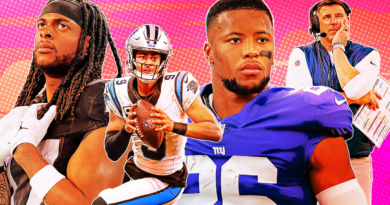Storms, stats, T-shirt cannons: Clippers' Halo Board goes all out
INGLEWOOD, Calif. — It didn’t take Steve Ballmer long to realize that he needed to build the LA Clippers a home of their own.
Six months after acquiring the franchise in 2014, Ballmer saw what life was like taking a backseat at Staples Center (now Crypto.com Arena) to the Los Angeles Lakers and NHL franchise Los Angeles Kings throughout the years.
“We got to build a place that is our house,” Ballmer said of the scheduling challenges the Clippers often faced. “We got to put the energy in our house. We didn’t want to play too many Monday night’s against Monday Night Football. We don’t want to play as many Saturday games.
“We don’t want to have to cover up banners of other guys in order to it at least feel marginally like our house. It has got to be our house.”
The Clippers no longer have to worry about covering up the Lakers’ championship banners and retired jerseys. When people look up at the state-of-the-art Intuit Dome, they will see a sight to behold.
Ballmer’s remarks came on Friday as he unveiled “The Halo Board” at the $2 billion arena — the largest double-sided video halo ever built, spanning almost a full acre.
The all-encompassing screen will have some elements that haven’t been seen at an NBA arena. Perched high above the court, it feels like a video game with different corners providing a variety of features, such as “Coach’s Corner” showing statistics and analytics from a shot chart.
It can also measure how fast players are getting up and down the floor, as well as how often the Clippers run a certain play. Ballmer says it can even show how many miles the referees are running.
“From the beginning from when Steve talked about what he wanted the Halo Board to achieve,” Gillian Zucker, CEO of Halo Sports and Entertainment, said at Friday’s unveiling. “He insisted that it needed to educate in addition to entertain.”
The Halo will have an option to focus on individual players, their story and even the charitable foundation they donate to pic.twitter.com/rrgayzt6dy
— Ohm Youngmisuk (@NotoriousOHM) July 19, 2024
There will be an area that shows graphics of players, real time social media posts by fans and even a “Steve Cam” that follows Ballmer’s every courtside fist pump.
During timeouts, there will be a “Player 360” mode which focuses on a player’s stats, bio and even the charitable foundation that player supports.
“It was dope for them to promote other things going on in my personal life,” said Clippers guard Terance Mann, who was on hand to see himself used as the first example of the feature. “I’m assuming when it comes to free agency in the future, they use these tactics to get players in. They know what they’re doing here.”
The Halo Board also can measure how loud fans are screaming, utilizing a system that can narrow audio level down to a single seat, according to Zucker. And it has T-shirt cannons at the top ready to launch free shirts to fans seated at the top of the arena.
Enter the storm⛈️ 🌊 @Daktronics | #IntuitDome pic.twitter.com/d7GENlQR3I
— Intuit Dome (@IntuitDome) July 19, 2024
In addition to having countdown clocks posted around the arena to get fans back into their seats during breaks, the board’s “Enter the Storm” simulation will start the second half of games complete with the sounds of being caught out at sea.
Ballmer wanted everything about the arena — from the players’ adjacent practice facility down to the comforts of the seats, which include power to charge phones and controllers on each arm rest to allow fans to interact with the Halo Board during breaks — to be the best in the NBA.
“Just knowing that we have our own space,” Mann said. “Kind of building our own aura is definitely a dope situation to be in as a player, instead of sharing with that other team on the other side of town.”




